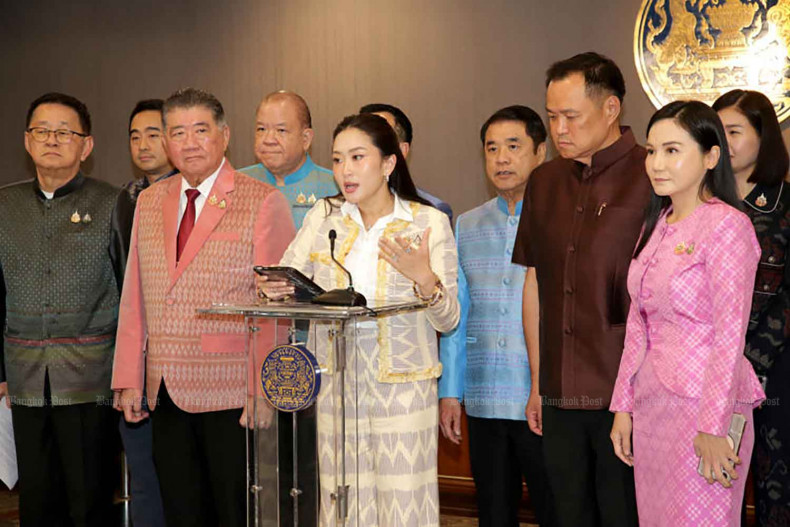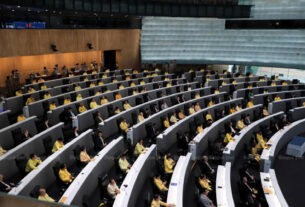Paetongtarn Shinawatra voiced strong confidence in the coalition government’s ability to withstand an imminent censure debate sought by the opposition, underscoring that unity within the coalition is the essential ingredient for its continued success. The prime minister, who is widely viewed as a prime target in the no-confidence proceedings slated to convene from March 24 to March 28, stated she was not deterred by the grilling. She expressed belief that she could answer all questions posed during the debate, sharing this outlook after a Tuesday night dinner meeting with coalition party leaders. An informed source noted that the main opposition party, the People’s Party, shifted its focus from targeting ten cabinet ministers—including the premier—to concentrating on Paetongtarn Shinawatra as the sole target. This pivot followed a leak about which ministers would be grilled, and the move aligned with the government’s plan to shorten the debate from five days to two days. The source added that the dinner invitation was limited to party leaders and secretary-generals, reflecting a strategic approach to the discussions.
Censure Debate Timeline, Target, and Strategic Context
The censure debate represents a critical moment for the coalition government, testing its ability to navigate parliamentary scrutiny while maintaining policy cohesion and political stability. The opposition’s original stance—targeting a broad slate of cabinet ministers—would have necessitated a wide-ranging dialogue across multiple ministries, potentially amplifying media attention and public scrutiny. In contrast, the shift to focusing on Paetongtarn Shinawatra as the primary focal point signals a strategic calculus by the opposition, aiming to concentrate pressure on a single prominent figure within the coalition. This approach could simplify the opposition’s messaging while intensifying scrutiny of the premier’s leadership and decision-making.
The decision to reduce the debate window from five days to two days adds another layer of tactical calculation. A condensed timeline compresses the opportunity for extended opposition arguments and for cross-ministerial coordination within the government, thereby elevating the importance of pre-emptive preparation and unified response strategies. The fact that the information about the targeted ministers was reportedly leaked and subsequently used to justify narrowing the debate suggests a highly strategic information environment surrounding the no-confidence motion. In this context, the coalition’s ability to present a coherent, unified front becomes not only a matter of political optics but also a practical component of governing during a sensitive parliamentary episode.
The dinner meeting, described as a closed-door event with invitations limited to party leaders and secretary-generals, underscores the seriousness with which the coalition contends with the censure process. The decision to keep discussions off the public record signals a preference for candor and frank exchanges among senior party figures as they map out coordinated actions, messaging, and voting strategies. The closed setting is designed to facilitate more direct deliberation on how to maintain coalition unity, align stances across ministries, and respond to the opposition’s lines of attack in a timely and disciplined manner.
Coalition Unity as a Core Pillar of Governance
Paetongtarn Shinawatra emphasized that the censure debate would be discussed in detail with the objective of preserving the coalition’s unity and stability. She asserted that all coalition members would assist one another in facing the debate, spanning across all ministries. This stance reflects a deliberate strategy to emphasize collective responsibility and mutual support within the governing alliance, which can project strength to voters and stakeholders who seek consistency in policy direction during a period of parliamentary challenge.
The prime minister also indicated that each party would undertake internal discussions to ensure that decisions are made in a coordinated way when participating in the no-confidence vote. This suggests a deliberate process of cross-party alignment and strategic synchronization, designed to minimize discord and present a unified parliamentary posture. The importance of such alignment is heightened by the potential political consequences of the censure motion, which could influence public perception of the coalition’s governance and its ability to implement policy agendas in a stable, cross-party environment.
Deputy Prime Minister Anutin Charnvirakul later highlighted the premier’s leadership in guiding the coalition to stay united and to assist one another in protecting the targeted cabinet ministers. This public framing reinforces the message that leadership within the coalition is actively steering collaborative action and defending its members in the face of internal and external pressures. The emphasis on collective action, in Anutin’s account, positions the coalition as a cohesive unit capable of weathering parliamentary scrutiny through solidarity and coordinated defense.
Dinner Meeting and the Closed-Door Deliberations
The Tuesday night dinner meeting, which brought together coalition party leaders and secretary-generals, was described as a closed-door gathering to facilitate frank and comprehensive discussion on a range of topics, including the censure debate. The decision to keep the session private aligns with a strategic aim to cultivate trust and open dialogue among the top echelon of coalition parties, away from public scrutiny and media interpretation. This format can help senior officials align their messaging, refine their stance on the no-confidence vote, and rehearse responses to potential questions or scenarios that may arise in parliamentary settings.
During the session, participants reportedly engaged in a thorough examination of how to maintain unity and stability within the coalition while ensuring cross-ministerial support for each other. The discussions were framed as essential to the coalition’s ability to present a cohesive front when the censure debate proceeds, and to prevent internal disagreements from leaking into public discourse and complicating parliamentary proceedings. The strategic objective was clear: to equip each party with a shared understanding of the process, to establish agreed-on lines of questioning and response, and to rehears the potential implications of the no-confidence motion for the government’s broader policy agenda.
In addition to the core purpose of discussing the censure scenario, the closed-door format likely allowed participants to exchange candid viewpoints about anticipated opposition arguments, potential vulnerabilities, and the most effective ways to defend the government. The emphasis on unity and mutual assistance across ministries points to a broader motive: to ensure that the administration can deliver consistent governance and maintain voter confidence even under intense parliamentary scrutiny.
Opposition Strategy, Information Leaks, and Targeted Focus
An informed source indicated that the opposition party had adjusted its target after receiving leaked information about which ministers would be grilled. This development explains part of the rationale behind narrowing the scope of the censure to Paetongtarn Shinawatra, moving away from a broader set of cabinet ministers. The leak appears to have provided the government with advance awareness of the opposition’s lineup, enabling preemptive strategic planning to fortify the premier’s defenses and to coordinate a unified response across the coalition.
The shift to a singular focal point for the censure highlights a tactical decision by the opposition to concentrate its fire in a way that could maximize political impact. A single, prominent target can simplify media narratives and public debate, potentially elevating the scrutiny of the premier’s leadership while presenting a clear interrogative path for parliamentary questioning. However, it also concentrates risk: if the targeted figure emerges with a strong defense and a well-coordinated coalition response, the opposition faces the challenge of maintaining momentum within a compact timeframe.
The Alpine land dispute, raised by Paiboon Nititawan, secretary-general of the Palang Pracharath Party (PPRP), is noted as an item on the agenda in this dynamic. While the exact implications of this issue for the censure debate remain to be assessed, its inclusion in the discourse signals that party leadership is mindful of broader governance concerns that can influence parliamentary dynamics and coalition bargaining. The interplay between the no-confidence motion and specific policy disputes—such as land matters—could shape the floor debates, committee discussions, and the overall tone of the political contest.
Parliamentary Process, Whips, and Unknowns
Deputy Transport Minister Manaporn Charoensri, who represented the government whip at a meeting with opposition and Senate whips on Wednesday, provided clarity on the status of the censure motion. He noted that, since the opposition had not yet submitted its censure motion in parliament, the exact number of targeted ministers or specific names remained unknown at that moment. This acknowledgment underscores the procedural uncertainty that typically accompanies the early phase of no-confidence processes, where formal motions, timelines, and target lists are contingent on parliamentary filings and scheduling.
The parliamentary process is further complicated by the involvement of multiple actors within the governing coalition and the opposition. The role of whips—responsible for ensuring party discipline and coordinating voting behavior—becomes especially critical as the no-confidence motion moves through committees, debates, and potential votes. The lack of a formal censure filing at the time of these discussions necessitates ongoing coordination among coalition partners to anticipate possible parliamentary moves and to prepare aligned responses, messaging, and strategy once the motion is formally introduced.
The assertion by Paiboon Nititawan that the Alpine land dispute would appear on the agenda signals the willingness of opposition or allied voices to foreground policy-specific concerns within broader parliamentary scrutiny. While this may add depth to the policy debate, it also raises the political stakes for the coalition, as land issues can carry significant public significance and may influence public perception of the government’s governance capabilities in key policy areas.
Party Roles, Internal Dynamics, and Strategic Messaging
Paiboon Nititawan, secretary-general of the Palang Pracharath Party (PPRP)—one of the opposition parties—spoke to the evolving agenda and highlighted the Alpine land dispute as a topic for consideration. This statement situates the debate within the broader context of party leadership dynamics and policy priorities, illustrating how opposing factions frame issues to appeal to their constituencies and to shape parliamentary discourse.
Deputy Prime Minister Anutin Charnvirakul’s remarks further reinforced the narrative of robust leadership and unified action within the coalition. By publicly recognizing the premier’s insistence on collective responsibility and on assisting each other in safeguarding the targeted ministers, Anutin’s comments underscore a messaging strategy aimed at reassuring supporters and signaling to rivals that the government is prepared to endure scrutiny through disciplined coordination and mutual support. The implications for internal party cohesion are notable, as leadership voices project a concerted effort to manage the political challenge while preserving policy continuity.
The combination of internal coordination, strategic messaging, and a narrowed target set creates a multi-layered political environment. The coalition must balance the imperative of responding effectively to opposition lines of attack with the necessity of maintaining coherence across diverse party platforms and policy priorities. The dynamic also risks amplifying intra-coalition negotiations, as different factions push for policy considerations or protective stances in the context of the no-confidence motion.
Implications for Governance, Stability, and Public Perception
The reported confidence and coordinated approach within the coalition signal an emphasis on governance stability amid parliamentary scrutiny. A united front can reassure markets, business leaders, and citizens who seek continuity in policy direction and administrative functioning, even under political pressure. The emphasis on cross-ministry cooperation and shared responsibility highlights the government’s intent to preserve policy implementation momentum despite the censure process.
Public perception is likely to hinge on how convincingly the coalition can articulate a coherent narrative that links its unity to effective governance. The strategic narrowing of targets and the prioritization of unity may be designed to minimize visible internal divisions and present a stable governing image. However, the outcome of the censure debate will inevitably shape how voters evaluate the coalition’s capacity to withstand opposition pressure, address policy challenges, and maintain public confidence in leadership.
The Alpine land dispute agenda item adds a concrete policy dimension to the political contest, illustrating how specific governance issues can intersect with broader parliamentary dynamics. Depending on the discourse and the positions advanced by various parties, such policy topics can influence public opinion about the administration’s competence and the practicality of proposed solutions. The balance between political maneuvering and substantive policy discussion will be a focal point as the debate unfolds.
Looking Ahead: Next Steps for the Coalition and Parliament
As the censure debate approaches, the coalition is likely to continue refining its unified stance, messaging, and cross-ministry coordination strategies. The leadership’s focus on unity and mutual support will be tested in parliamentary forums, media coverage, and public discourse, where the opposition may seek to magnify perceived vulnerabilities. The government’s approach to responding to questions, presenting its record, and defending its ministers will be critical to maintaining public trust and legislative support.
Parliamentary procedures will guide the formal progression of the no-confidence motion, with whips coordinating voting blocs and party positions. The uncertainty surrounding the exact number of targets and the composition of the targeted ministers means ongoing negotiations and strategic planning will be essential. The Alpine land dispute’s inclusion on the agenda could add a substantive dimension to policy debates, potentially shaping the conversation beyond procedural considerations and influencing policy discourse within the chamber.
Conclusion
In a moment of heightened parliamentary scrutiny, Paetongtarn Shinawatra’s leadership message centers on unity as the cornerstone of the coalition’s resilience. The shift in opposition targeting—from multiple ministers to a single focal figure—reflects a calculated strategic maneuver that carries implications for how the debate will unfold and how the government will respond. The decision to shorten the debate window, the closed-door dinner that preceded it, and the ongoing coordination across ministries all underscore a deliberate effort to present a cohesive, organized front in the face of no-confidence pressure. Deputy Prime Minister Anutin Charnvirakul’s reiteration of leadership and coalition solidarity further reinforces the portrayal of stability and coordinated governance, even as the opposition mobilizes to challenge the administration.
As the parliamentary process advances, the coalition’s ability to maintain a unified stance, deliver consistent messaging, and address policy concerns—such as the Alpine land dispute—will be instrumental in shaping public perception and potential electoral outcomes. The coming days will test the resilience of cross-party cooperation and the government’s capacity to navigate a high-stakes no-confidence motion with careful planning, disciplined execution, and strategic public communication.



